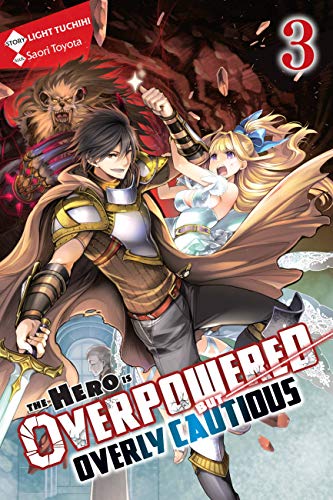By Light Tuchihi and Saori Toyota. Released in Japan as “Kono Yuusha Ga Ore TUEEE Kuse Ni Shinchou Sugiru” by Kadokawa Books. Released in North America by Yen On. Translated by Matt Rutsohn.
Though they share few similarities except for being comedies, I was reminded quite a bit of My Next Life As a Villainess while reading this 3rd volume of a series that was clearly designed to be two volumes long. Bakarina struggled for several volumes to try to find a way forward, and this volume of Cautious Hero does the same. That said, Cautious Hero has a lot more to walk back; at the end of the second volume Rista has been told who she is, and who Seiya is, and their destiny. Even better, when Seiya is called forth as a hero once more at the start of this book, he remembers what happened, and seems to actually return Rista’s feelings! Sure, they have to save the world, but he’s powerful, she’s a goddess, they’re in love, it’s great, right? Wrong. No one is reading the series for that. And so, sure enough, by the middle of the book, love has been trodden on and Seiya is using Rista as a comedic punching bag again. Know what your audience wants.
Those who read the first two books, or saw the anime (popular enough to get the two leads a cameo in Isekai Quartet’s second season) will be surprised at the cover art, showing a grinning, not-at-all-cautious Seiya charging forward. It’s the start of a long line of bad things happening to Rista. An enemy hits Seiya with an amnesia stat, meaning he’s back to his old reckless personality… and his love for Rista has gone down. Then, after more plot stuff happens, he loses the amnesia and is back to being Seiya… but thinks of Rista as an annoying weed. Yes, we’re back to baseline there. Honestly, it’s probably for the best, as this world is, as promised, much worse than the previous one. Humanity is not only enslaved but eaten, and the beastmen rule supreme. Seiya has to rescue the slaves in the old town they used to be fron, then he has to infiltrate the palace guard and take on the lion-headed big bad, Grandleon.
Does the book succeed at walking everything back? Partly, I’d say. Some of Seiya’s treatment of Rista, while horrible, does cross the line into funny, particularly his use of her as a periscope. The reader is, I think, meant to infer that his feelings for her are not rock bottom but that he’s faking that stat… but if so, he’s really good at it – even the old Queen at the end takes back her “he loves you deep down” speech after he’s appalling once more. Where the book does succeed, as always, is with Rista, who does not remember her life as Tiana, but that doesn’t stop it emotionally affecting her, particularly when she finds Tiana’s mother held prisoner and being tortured. Rista’s frustration and resolve waver constantly throughout the book, but at the end, her honest exhortation to Seiya actually gets through to him and makes him do the right thing. It was nice to see.
Of course the world’s not saved yet, and even stronger bad guys are on the way. Fans of this series had better be prepared for more of what the anime did best – comedy slapstick violence. That said, there’s enough character development in Rista to make this a series still well worth reading.
